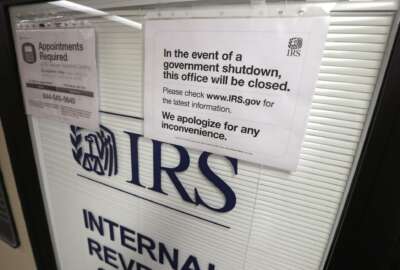

If confirmed, Danny Werfel would be the first IRS commissioner to spend a significant portion of the $80 billion meant for the agency to rebuild its workforce and...
The Biden administration is looking to a familiar face to put tens of billions of dollars to good use at the IRS.
President Joe Biden last year nominated Danny Werfel, a former acting IRS commissioner, to serve as permanent commissioner for a five-year term.
If confirmed, Werfel would be the first IRS commissioner to spend a significant portion of the $80 billion in the Inflation Reduction Act meant for the agency to rebuild its workforce and modernize its legacy IT over the next decade.
“Following the passage of the Inflation Reduction Act, Americans rightly expect a more modern and high-performing IRS,” Werfel told the Senate Finance Committee hearing on Wednesday.
Werfel, during his confirmation hearing, said he’d focus on the IRS answering more phone calls and shrinking a growing tax gap between what taxpayers owe and what the agency is able to collect each year.
“There’s more the IRS can be doing to reach out, especially to taxpayers that don’t have the means to hire accountants or law firms to navigate the tax system,” Werfel said. “There has to be an objective to meet taxpayers where they are. If they can’t afford the resources to help them navigate, how can the IRS do more to answer their questions?”
Treasury Secretary Janet Yellen has directed the IRS to prioritize improvements to taxpayer experience with the funding it has received. Werfel said the agency is committed to staffing up Taxpayer Assistance Centers for in-person help and making more tax-help resources available online.
“I’m ready to roll up sleeves and do what we can to help working families, small businesses meet their tax obligations in a much easier way than it has been to date,” he said.
Werfel said he’s concerned that the IRS, after more than a decade of underfunding has “gaps in capacity that have impeded the IRS’ ability to meet its critical mission.”
“The result is that hardworking, honest taxpayers who need assistance in meeting their tax obligations are not getting the services they need,” Werfel said.
The IRS last year answered about 13% of calls from taxpayers seeking help with their returns. Early in this year’s filing season, however, senators said the IRS has been answering about 90% of incoming calls.
The IRS is also committed to beefing up its enforcement operations under the IRA.
Werfel said the IRS has also been “ill-equipped” to handle the complex tax returns of high-income taxpayers. He said the IRS under his leadership would focus on hiring tax experts who have prepared returns for high-income individuals and businesses.
“I’m not sure that training the current workforce will be sufficient. I think we want to hire and bring in experts, maybe some of the same individuals that, earlier in their careers, prepared these very intricate returns and are ready to come back and potentially serve their country and maybe years later help us unpack them,” he said.
Former IRS Commissioner Chuck Rettig told Congress in April 2021 that the IRS has been “outgunned” to audit high-income individuals and companies.
Werfel said increased hiring at the IRS would help the agency narrow a widening tax gap, as well as help the agency better understand the scope of taxes owed that the agency doesn’t collect every year.
The IRS officially estimates about $540 billion in taxes goes unpaid each year. Rettig, however, told lawmakers that figure is outdated, and could be as high as $1 trillion a year.
Werfel said increased staffing in the IRS enforcement division would not only help the IRS shrink the tax gap, but also better understand the scope of the problem.
“They will be able to not only unpack and help collect more revenue from high-income taxpayers and large corporations, but also understand how to better measure that, so that going forward, the tax gap assessment has a more clear picture of what this gap is,” Werfel said.
Werfel said he would also focus on “rebalancing the audit footprint” at the IRS, to ensure the IRS isn’t disproportionately auditing low-income households or certain racial demographics.
“If poor people are more likely to be audited than wealthy, that is something that I think potentially degrades public trust, and needs to be addressed within the tax system,” Werfel said, addressing research reports that shows the agency targets low-income households and African-American individuals for audits at a higher rate than other demographics.
Werfel said the IRS would also try to initiate fewer audits with taxpayers who are fully caught up with the taxes they owe.
“I want to take a look with the IRS team at other audits, and figure out if there’s a way to determine where, essentially, we’d be wasting our time to go on [an] audit, because there’s such a high percentage and a high probability that the balance due is already being paid. And by that, we can go after more issues where there might be something underlying that’s nefarious,” he said.
The IRS, under Yellen’s direction, expects to release a report to Congress later this month on the next steps for spending the $80 billion in IRA funding. Werfel told the committee that the IRS, under his leadership, would publicly release that plan.
“Let’s be public about the plans, and let’s make sure that we’re building trust in the way forward,” he said.
In addition to his time as acting IRS controller, Werfel previously served as Office of Management and Budget controller, where he oversaw federal stimulus spending in the aftermath of the 2008 recession.
“For many years, I was known around town as the improper payments guy. That was my job for both President [George W.] Bush and President Obama. I’ve thought a lot about this issue,” Werfel said.
Committee Chairman Ron Wyden (D-Ore.) said the IRS having the resources to improve its IT and staff up its customer service division is “a big win” for both the agency and taxpayers.
The IRS has some of the oldest legacy technology in the federal government, and relies on outdated systems that struggled to communicate with each other. Wyden said modernizing those systems would “help the IRS better use the information it already has.”
“Better technology and better customer service personnel is going to allow us to go a long way to relieving headaches for typical taxpayers and small businesses,” Wyden said. “More customer service personnel is going to make a big difference, because in the past it’s been a struggle to get anybody on the phone when you call the IRS with a question.”
Lawmakers, however, are skeptical whether the IRS can use its newfound resources to adequately improve its level of service to taxpayers.
Committee Ranking Member Mike Crapo (R-Idaho) warned “supersized IRS enforcement hiring” would lead to the agency “chasing speculative or marginal revenue recoveries.”
“Sending the IRS on an unchecked spending binge has no intrinsic value. Unless there are outsized results to match the gargantuan investment, the IRS’s supplemental billions will simply become another example of government waste,” Crapo said.
A recent watchdog report shows a decade-long plan for the IRS to modernize a key component of its legacy IT is falling behind.
The Government Accountability Office found in a recent report that the IRS recently suspended two modernization initiatives essential to replace the 60-year-old Individual Master File (IMF). The IMF is the IRS’ authoritative data source for every individual taxpayer.
IRS officials told GAO it suspended work on the projects to shift resources to higher priorities. The IRS said last year it hopes to replace the IMF by 2030, but GAO said that timeline is now less clear.
“It feels like every time we try to upgrade the IT systems at the IRS, it’s been failed efforts,” Sen. Mark Warner (D-Va.) said.
While the IRS faces its share of challenges and scrutiny, lawmakers appear prepared to advance his nomination.
Sen. Thom Tillis (R-N.C.) said he intends to support Werfel’s confirmation.
“I think that it’s important to know that somebody with some enterprise transformation experience, particularly in the public sector, is desperately needed at the IRS,” Tillis said.
Crapo said the next IRS commissioner “shoulders the primary responsibility for outcomes” under the IRA spending.
“If confirmed, Mr. Werfel, you must be the change agent we have long been promised,” Crapo said.
Copyright © 2024 Federal News Network. All rights reserved. This website is not intended for users located within the European Economic Area.
Jory Heckman is a reporter at Federal News Network covering U.S. Postal Service, IRS, big data and technology issues.
Follow @jheckmanWFED



